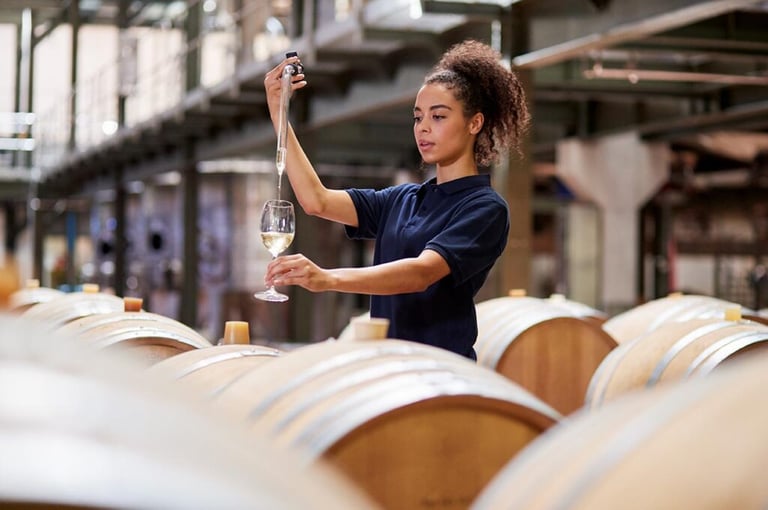
Subscribe to our newsletter
Women in Wine
Shaping the Future of Fine Wine Investment
11/14/20243 min read


The fine wine industry, long dominated by men, is experiencing a dynamic shift. Today, women are making their mark as winemakers, vineyard owners, and leaders in sustainable practices, driving innovation in one of the world’s oldest luxury markets. From trailblazing entrepreneurs to celebrated winemakers, women are not only shaping the future of wine but also influencing trends in wine investment.
In this article, we explore the impact of women in the wine industry and why their contributions are invaluable to collectors and investors alike.
Pioneers of Change: Female Winemakers Leading the Way
Historically, women in the wine industry have had to overcome significant barriers to success. Yet, those who persevered have reshaped the industry, bringing fresh perspectives and sustainable practices that resonate with today’s values-driven consumers and investors.
Take the legendary Lalou Bize-Leroy, a trailblazer from Burgundy, France, and owner of Domaine Leroy. Her commitment to biodynamic farming and meticulous winemaking has resulted in some of the most sought-after wines globally. Lalou’s work highlights how women are driving the movement towards sustainability and authenticity, values that are increasingly important to both wine lovers and investors.
Another iconic figure is Dr Laura Catena, the managing director of Bodega Catena Zapata in Argentina. Known for elevating Argentina’s Malbec to international fame, Laura has positioned Catena Zapata as a key player in the fine wine investment market, blending tradition with innovation. Her work is a testament to how female leadership is steering wineries to new heights, both in production and investment value.
Female-Led Wineries to Watch
As female winemakers continue to push the boundaries of excellence, collectors and investors should take note of the wineries they lead. Here are three prominent female-led wineries that are making waves in the industry:
1. Domaine Leroy (Burgundy, France)
Owned by Lalou Bize-Leroy, Domaine Leroy produces some of the finest biodynamic wines in the world. The scarcity and quality of these wines make them a top-tier investment, with strong long-term value.
2. Catena Zapata (Mendoza, Argentina)
Under the leadership of Dr Laura Catena, Catena Zapata has earned a global reputation for producing outstanding Malbec. The winery's consistent critical acclaim and international demand ensure that its wines remain highly investable.
3. Screaming Eagle (Napa Valley, USA)
Screaming Eagle, one of Napa Valley's most exclusive wineries, was brought to prominence by winemaker Heidi Barrett. Known for its cult-status Cabernet Sauvignon, Screaming Eagle wines are highly coveted, fetching astronomical prices at auctions and representing a sound investment choice.
Sustainable Practices: A Key Investment Trend
One of the most significant contributions that female winemakers are making to the wine industry is their focus on sustainability. From organic and biodynamic farming to reducing carbon footprints, women are at the forefront of environmentally-conscious winemaking. This aligns with the growing consumer and investor demand for products that reflect ethical and sustainable practices.
Investing in wineries that prioritise sustainability can yield long-term benefits, not only in terms of financial returns but also in supporting practices that ensure the preservation of vineyards for future generations. As consumer awareness of environmental issues increases, wines produced sustainably are likely to see continued appreciation in both demand and value.
Leading the Charge: Sara Pérez (Mas Martinet, Spain)
Sara Pérez, winemaker at Mas Martinet in Spain's Priorat region, has made a name for herself by embracing biodynamic practices and focusing on sustainability. Her wines reflect the terroir of the region, offering collectors a unique, artisanal product that is not only investment-worthy but also environmentally friendly. As sustainability becomes increasingly critical in consumer decision-making, Pérez's work exemplifies the value of investing in wines that prioritise the planet.
Women in Wine Investments: A Growing Market
The rise of women in wine has not only reshaped the way wines are produced but has also opened up new opportunities in the investment market. Female-led wineries are receiving growing attention from critics, collectors, and investors, and their wines are increasingly being recognised as smart investments with solid returns.
Moreover, the narrative around women in wine resonates with modern consumers, who are seeking out brands that champion diversity and equality. For investors, supporting female-led wineries can be both a financially savvy and socially responsible choice.
Supporting Inclusivity and Collaboration
The impact of women in wine extends beyond winemaking itself. Female leaders are fostering a culture of inclusivity and collaboration within the industry. As co-founder of Club de Mujeres Profesionales del Vino in both Argentina and Spain, I have personally seen the power of women supporting each other in this traditionally male-dominated field. These organisations provide platforms for knowledge exchange, mentorship, and professional growth, further strengthening the influence of women in the wine industry.
Investors looking to align their portfolios with brands that prioritise collaboration, diversity, and community building should consider female-led wineries as a key area of focus.
Conclusion: The Future is Female
The contributions of women to the wine industry are profound, and their influence is only set to grow. From leading the charge in sustainable winemaking to crafting some of the most exceptional wines in the world, women are redefining what it means to succeed in the fine wine market. For investors, recognising and supporting the work of female winemakers offers both financial rewards and the opportunity to be part of a movement that values innovation, sustainability, and inclusivity.
